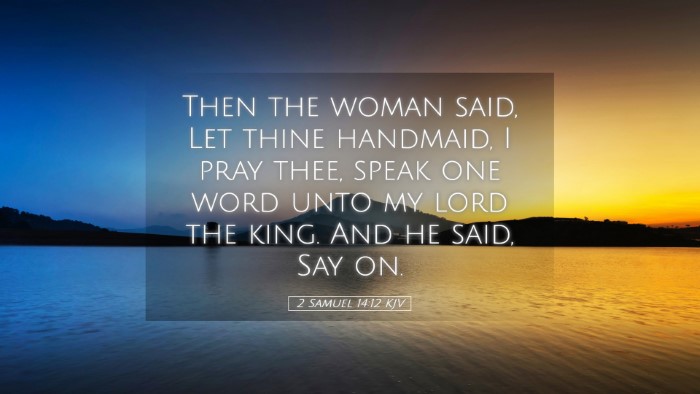Commentary on 2 Samuel 14:12
Verse Overview: 2 Samuel 14:12 states, "Then the woman said, 'Please let your servant speak a word to my lord the king.' He said, 'Say on.'"
Historical Context
In this chapter, we find Absalom's sister Tamar has been wronged, and the tension in David's household is reaching a boiling point. The dialogue between the woman of Tekoa and King David serves as a crucial moment in the narrative, revealing the dynamics of power, justice, and the human heart's complexities.
Commentary Insights
Matthew Henry's Commentary
Matthew Henry emphasizes the wisdom and courage of the woman from Tekoa. She approaches the king with a request that seems to come from a place of deep understanding and experience. Her ability to gain the king’s attention reflects a strategic awareness of royal etiquette and authority.
Henry notes that this woman embodies the role of intercessor, advocating not only for herself but also for her situation that parallels the plight of Absalom and David. In her humble approach, she leads David gently into a conversation that ultimately reveals his own unresolved familial conflicts, providing a template for pastors and leaders to understand the dynamics of intercession and advocacy.
Albert Barnes' Commentary
Albert Barnes elaborates on the significance of the phrase, "Say on," which indicates David's readiness to hear the woman’s petition. This moment highlights the importance of listening—a virtue for leaders and pastors striving to address the needs of their congregations effectively.
Barnes explains that this verse serves as a pivotal point in the narrative. The woman’s approach not only aims to gain justice for her cause but ultimately seeks reconciliation, mirroring the broader themes of restoration that resonate throughout David's reign. Pastors can draw valuable lessons on the importance of effective communication, empathy, and the role of listening in the ministry.
Adam Clarke's Commentary
Adam Clarke highlights the tactical brilliance of the woman’s speech. He analyzes her capability to present her story in a manner that captivates the king’s interest, indicating the necessity for wisdom and discernment in addressing matters of controversy. Her role necessitates profound understanding of human emotions and relationships.
Clarke also points out that her plea for justice is not merely a personal affair; it reflects greater societal issues of family honor and the consequences of sin. The broader implications of her story serve as a reminder for theologians and scholars about the continual need for justice and moral integrity in leadership. Clarke underscores how this interaction between the woman and the king exemplifies the challenges of governance and the need for leaders who are just and approachable.
Theological Implications
This verse invites readers to explore themes of mediation, familial strife, and the nature of divine justice. The woman's plea serves as a microcosm of the larger narrative arc concerning the inhabitants of David's court and the tribulations facing Israel as a nation.
- Mediation and Advocacy: The woman acts as a mediator for her people, which parallels the roles of prophets and Jesus Christ as the ultimate intercessor.
- Listening as a Leadership Quality: David’s readiness to listen symbolizes the importance of a leader who is tuned into the cries of the vulnerable.
- The Complexity of Justice: The narrative invites reflection on what true justice looks like, especially within fractured family dynamics.
Practical Applications
For pastors, theologians, and scholars, the examination of 2 Samuel 14:12 can provoke thoughtful discussions regarding the qualities of effective leadership and the role of communication in pastoral care. The narrative encourages leaders to:
- Develop empathy through understanding the challenges faced by their congregants.
- Engage in active listening that promotes trust and openness in their communities.
- Be aware of underlying issues within their congregations that may reflect broader social or familial struggles.
Conclusion
2 Samuel 14:12 serves as a profound reminder for leaders within the church to embody the qualities of integrity, wisdom, and compassion. The intersection of personal and communal justice reflected in this verse provides fertile ground for prayerful reflection and strategic pastoral ministry. The insights from Henry, Barnes, and Clarke form a holistic approach to understanding this text, benefiting all who seek to unlock its timeless lessons.


